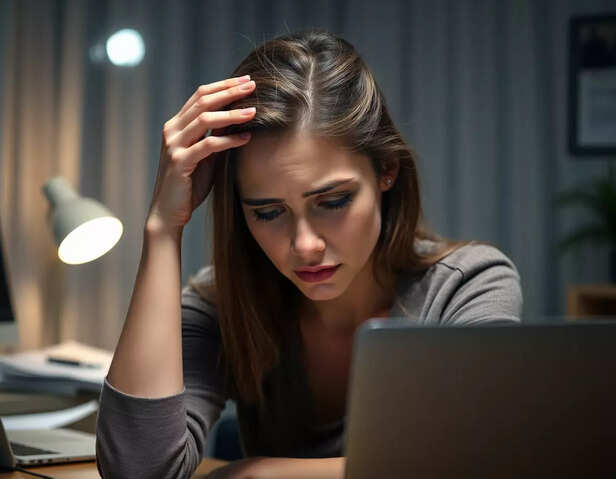7 Things You Should Never Do Right Before Bed
Nikita Kanyal | Oct 21, 2024, 19:55 IST
( Image credit : Timeslife )
For better sleep avoid these sleep habits: using electronic devices, consuming caffeine or nicotine, eating heavy meals, drinking alcohol, exercising, stress, thinking or more, and drink water. These activities can disrupt melatonin production, digestion, heart rate and relaxation and lead to poor sleep. Instead, stop relaxing and maintain a good sleep schedule to improve rest and overall well-being.
Good sleep is essential for both physical and mental wellbeing. However, many of us participate in habits shortly before bed that reduce the quality of our sleep. Here are seven things you should avoid before bed for a pleasant and restful sleep.

The sleep quality can be significantly impacted by the blue light emitted from smartphones, tablets, laptops, and televisions. This light interferes with the synthesis of melatonin, a hormone that governs sleep. Reducing melatonin levels can lead to feeling tired and sleepy. The optimal practice is to power off electronic devices a minimum of 30 to 60 minutes prior to bedtime. Instead, opt for activities such as reading a hard copy book or engaging in relaxation practices.

Caffeine and nicotine act as stimulants, increasing heart rate and alertness to wake you up. The effects of caffeine in coffee, tea, chocolate and some medications can remain in your body for 6 to 8 hours. Also, the stimulating effect of nicotine in cigarettes and electronic cigarettes can prevent sleep. To avoid sleep problems, it is better to avoid eating these substances at least 4-6 hours before sleep.

Eating a large, heavy, spicy meal right before bed challenges the body to relax and sleep. It's important to give your body time to digest food, because taking too long to eat can cause gas, acid reflux, or pain. Ideally, try to finish your last meal at least 2-3 hours before going to bed. If you're hungry before bedtime, choose a light snack like a banana, yogurt, or a handful of nuts.

At first, alcohol induces sleep, but later disrupts sleep by reducing REM sleep, which is important for recovery. The next day you feel tired and exhausted. If you drink alcohol, do it a few hours before bed and limit your intake. You can move or talk loudly while sleeping. You can physically act out your dreams in your sleep , Because alcohol spreads throughout the body, including the muscles, it's easier for the airways to close during sleep. It may increase the risk of falling asleep, especially if you drink in the last few hours before going to bed.
5. Engaging in Intense Exercise

Although physical activity is beneficial for general well-being, working out just before bedtime can interfere with your sleep. Engaging in physical activity increases heart rate, body temperature, and adrenaline levels while preventing relaxation. Instead, consider participating in vigorous exercise at least 2 to 3 hours before bedtime. To relax before bed, consider engaging in mild yoga or gentle stretching exercises. Engaging in intense physical activity increases heart rate and raises body temperature, which can hinder the ability to fall asleep. Your body temperature will decrease naturally during the evening to facilitate your ability to fall asleep.

Thinking about today's events, worrying about tomorrow, or thinking about problems can cause stress and anxiety, making it difficult to sleep. It's important to keep your mind active during lockdown. To avoid this, create a restful sleep routine that includes activities such as deep breathing, meditation, or journaling. This will help the mind and prepare the body for rest.

Drink plenty of water! Staying hydrated is crucial, but drinking enough water immediately before bed can help you avoid trips to the bathroom at night. This can disrupt your sleep and make it harder to get the deep sleep you need. To avoid this, try to limit your water intake at least an hour before bed. If you are thirsty, drink a small amount of water, not a large glass of water. If sleep becomes an important part of your health, it will benefit your energy level, mood and well-being.
1.Using Electronic Device

Avoid using Electronics
( Image credit : Timeslife )
The sleep quality can be significantly impacted by the blue light emitted from smartphones, tablets, laptops, and televisions. This light interferes with the synthesis of melatonin, a hormone that governs sleep. Reducing melatonin levels can lead to feeling tired and sleepy. The optimal practice is to power off electronic devices a minimum of 30 to 60 minutes prior to bedtime. Instead, opt for activities such as reading a hard copy book or engaging in relaxation practices.
2. Consuming Caffeine or Nicotine

Caffeine can make your sleep feel less satisfying
( Image credit : Timeslife )
Caffeine and nicotine act as stimulants, increasing heart rate and alertness to wake you up. The effects of caffeine in coffee, tea, chocolate and some medications can remain in your body for 6 to 8 hours. Also, the stimulating effect of nicotine in cigarettes and electronic cigarettes can prevent sleep. To avoid sleep problems, it is better to avoid eating these substances at least 4-6 hours before sleep.
3. Eating Heavy Meals

Big meals may induce acid reluxe
( Image credit : Timeslife )
Eating a large, heavy, spicy meal right before bed challenges the body to relax and sleep. It's important to give your body time to digest food, because taking too long to eat can cause gas, acid reflux, or pain. Ideally, try to finish your last meal at least 2-3 hours before going to bed. If you're hungry before bedtime, choose a light snack like a banana, yogurt, or a handful of nuts.
4. Drinking Alcohol

Alcohol can make you feel tired
( Image credit : Timeslife )
At first, alcohol induces sleep, but later disrupts sleep by reducing REM sleep, which is important for recovery. The next day you feel tired and exhausted. If you drink alcohol, do it a few hours before bed and limit your intake. You can move or talk loudly while sleeping. You can physically act out your dreams in your sleep , Because alcohol spreads throughout the body, including the muscles, it's easier for the airways to close during sleep. It may increase the risk of falling asleep, especially if you drink in the last few hours before going to bed.
5. Engaging in Intense Exercise

can raise your heartbeat and disrupt your sleep
( Image credit : Timeslife )
Although physical activity is beneficial for general well-being, working out just before bedtime can interfere with your sleep. Engaging in physical activity increases heart rate, body temperature, and adrenaline levels while preventing relaxation. Instead, consider participating in vigorous exercise at least 2 to 3 hours before bedtime. To relax before bed, consider engaging in mild yoga or gentle stretching exercises. Engaging in intense physical activity increases heart rate and raises body temperature, which can hinder the ability to fall asleep. Your body temperature will decrease naturally during the evening to facilitate your ability to fall asleep.
6. Stressing or Overthinking

Try to stay calm
( Image credit : Timeslife )
Thinking about today's events, worrying about tomorrow, or thinking about problems can cause stress and anxiety, making it difficult to sleep. It's important to keep your mind active during lockdown. To avoid this, create a restful sleep routine that includes activities such as deep breathing, meditation, or journaling. This will help the mind and prepare the body for rest.
7. Drinking Too Much Water

Avoid drinking too much water
( Image credit : Timeslife )
Drink plenty of water! Staying hydrated is crucial, but drinking enough water immediately before bed can help you avoid trips to the bathroom at night. This can disrupt your sleep and make it harder to get the deep sleep you need. To avoid this, try to limit your water intake at least an hour before bed. If you are thirsty, drink a small amount of water, not a large glass of water. If sleep becomes an important part of your health, it will benefit your energy level, mood and well-being.
